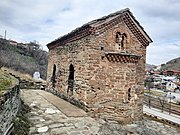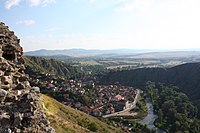|
Novo Selo (Štip suburb)This is an article about the suburb near the town of Štip. Not to be confused with the village with the eponymous name in the southern part of the Štip Municipality.
Novo Selo (Macedonian: Ново Село) is a suburb adjacent to the town of Štip. Geography and locationNovo Selo is located in the greater urban area of Štip and colloquially it is considered to be a suburb of the town. The access to Novo Selo is along the river Otinja, which in the village flows into Bregalnica. The settlement is located on both sides of Bregalnica and most of it is on the left side. Immediately above Novo Selo is the hill on which the Štip fortress is built, also called Isar or Isarot.[1] HistoryNovo Selo is one of the oldest settlements in this area. Although there is no precise data on its creation, it is assumed that Novo Selo existed as a separate settlement before the 13th century, as evidenced by the numerous churches from that period, including the Ascension of Christ Church, which is the oldest church in the vicinity of Štip. During the 13th and 14th century, Novo Selo was a waqf of Sultan Bayazit, and then, in the time of Sultan Murat, Novo Selo was declared a military and guard settlement, thus gaining special rights and privileges. According to the 1519 census, there were 21 Christian families living in Novo Selo. In the census registers of 1570, 30 Christian families and 5 unmarried Christians were registered in Novo Selo.[2]  In the 19th century, Novo Selo played an important role in awakening the national consciousness and the struggle against the Ottoman rule, especially with the arrival of Damjan Gruev and Goce Delčev, who worked as teachers in the Novo Selo School.[3] At the beginning of the 20th century, Novo Selo was inhabited exclusively by a Bulgarian Christian population. All its inhabitants fell under the supremacy of the Bulgarian Exarchate. According to the data of the Exarchate Secretary Dimitar Mishev ("Macedonia and its Christian Population") in 1905. There were 3,616 Bulgarians living in the village (all under the Exarchate) and there were two Bulgarian schools – one primary and one secondary school with 412 students.[4] DemographicsAccording to the 2002 census, the suburb of Novo Selo had over 3,636 inhabitants, all Macedonians.[1] Education The Rectorate of the Goce Delčev University is located in Novo Selo. The Rectorate is located in the building of the former Novo Selo School. Religion   There are six Christian Orthodox churches located within Novo Selo:
SightsNotable peopleReferences
External linksWikimedia Commons has media related to Category:Novo Selo (settlement in Štip). |
||||||||||||||||||||

